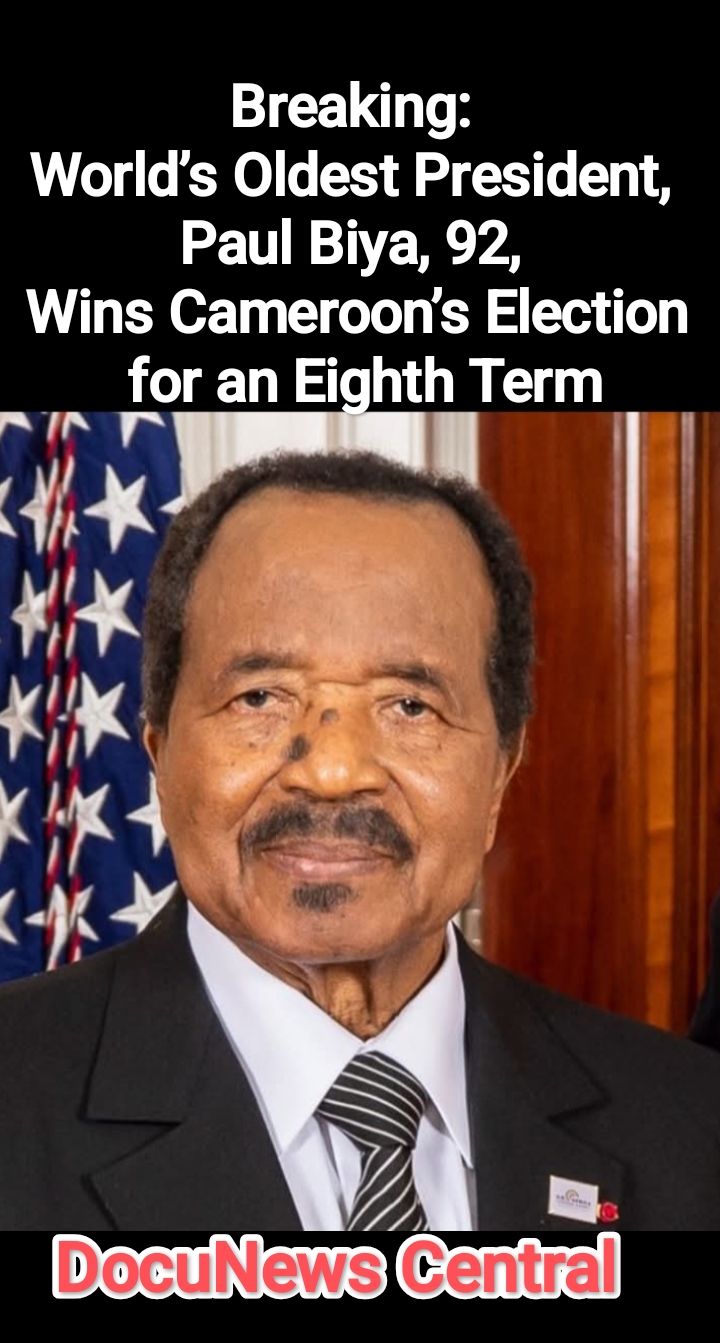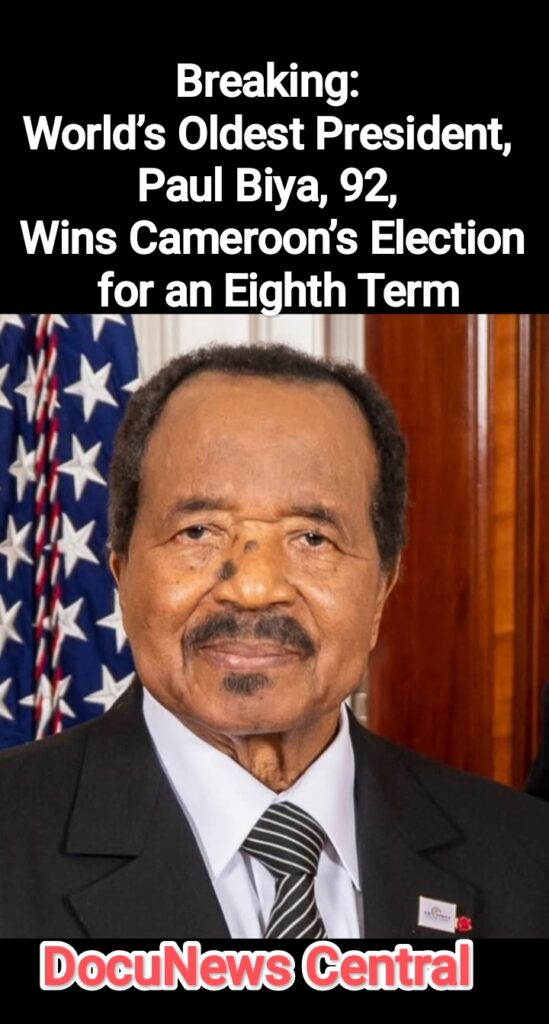

In a historic and highly contested election, Paul Biya, the 92-year-old leader of Cameroon, has once again extended his decades-long rule by winning his eighth presidential term. The official results were confirmed by Cameroon’s Constitutional Council on October 27, 2025, amid mixed reactions at home and abroad.
The election outcome has drawn attention from across the world, making Biya — already the world’s oldest serving president — a global talking point. According to credible media outlets such as Reuters, AP News, and France24, the veteran leader won with 53.66% of the votes, defeating his main challenger, Issa Tchiroma Bakary, who polled 35.19%.
This development marks yet another chapter in Biya’s long and controversial presidency, which began in 1982. Many international observers have raised questions about democratic standards, while others describe the victory as a symbol of continuity in an increasingly divided nation.
DocuNews Central reports that the election results have sparked renewed debate over political reform and generational change in Central Africa.
A Leader Who Has Outlived Eras
Paul Biya first came to power when Ronald Reagan was president of the United States and Nigeria’s government was under military rule. Over four decades later, he remains one of the last surviving figures from Africa’s post-independence generation.
His political journey began as a civil servant in the 1960s. Biya rose through the ranks to become Prime Minister and eventually took over the presidency in 1982, following the resignation of Ahmadou Ahidjo.
During his tenure, Cameroon has experienced both stability and stagnation. Supporters credit him with maintaining peace in a region surrounded by conflict. Critics, however, accuse his government of corruption, suppression of dissent, and limited economic growth.
According to Al Jazeera, Biya’s longevity in power has made him “a symbol of African resilience and resistance to political change.”
How the Election Unfolded
The presidential election held on October 12, 2025, was one of Cameroon’s most anticipated political events in recent years. Over 7 million registered voters participated in the polls, which were marred by technical glitches and allegations of irregularities in some regions.
International observers from the African Union and European Union noted that while voting was largely peaceful, the playing field was heavily tilted in favor of the ruling party, the Cameroon People’s Democratic Movement (CPDM).
Reuters reported that Biya’s campaign focused on promises of national unity, economic revival, and the restoration of security in the conflict-hit Anglophone regions.
Meanwhile, opposition figures, led by Issa Tchiroma Bakary and Maurice Kamto, accused the government of using state resources and media dominance to influence the outcome.
Despite the criticisms, the Constitutional Council declared Biya the legitimate winner, saying that “irregularities did not substantially affect the final result.”
Reactions From Across Cameroon
Following the announcement, celebrations erupted in Yaoundé, Douala, and other strongholds of the ruling party. Thousands of supporters took to the streets waving flags and chanting Biya’s campaign slogan, “Peace and Continuity.”
However, not everyone shared the joy. In opposition strongholds, protesters denounced the results as fraudulent and demanded a recount. Security forces quickly dispersed crowds in Buea and Bamenda, two cities in the restive Anglophone regions.
A joint statement by several civil society groups expressed concern that the outcome could “further alienate young Cameroonians seeking change.”
DocuNews Central gathered that international partners, including the United Nations and the African Union, have urged calm and called on all parties to respect constitutional processes.
A Deeply Divided Nation
Cameroon’s political divide runs deep. The nation is split not only along ethnic and linguistic lines but also between generations.
While older citizens often view Biya as a stabilizing figure, younger voters see him as a symbol of stagnation. Nearly 70% of Cameroonians are under 35, and many of them have never known another president.
“Biya represents the past,” said political analyst Dr. Ngassa Atanga in a quote published by The Guardian. “But for many rural communities, he remains a father figure who has kept the country from falling apart.”
Unemployment, corruption, and the ongoing Anglophone crisis remain major concerns. The conflict between English-speaking separatists and government forces has led to thousands of deaths and the displacement of over 600,000 people, according to Human Rights Watch.
International Reactions
Reactions from world leaders have been cautious but clear.
France’s President Emmanuel Macron congratulated Biya, expressing hope for “stability and inclusive dialogue.”
The United States urged Cameroon to prioritize reforms and address human rights issues.
The African Union praised the “peaceful conduct” of the election but called for “greater inclusivity and transparency.”
Meanwhile, several Western analysts have warned that Biya’s extended rule could deepen political fatigue and discourage democratic participation.
An editorial from AP News noted that “Cameroon’s political continuity comes at a time when its youth crave transformation.”
Why Biya Still Wins
Many wonder how Biya continues to secure victory after more than four decades in power. The answer lies in a combination of loyalty networks, political strategy, and control over state institutions.
His ruling party, the CPDM, has a strong presence across all ten regions of Cameroon. Over the years, Biya has skillfully balanced ethnic and regional interests, ensuring that no single faction dominates.
Additionally, the 2008 constitutional amendment removed presidential term limits, effectively allowing him to run indefinitely.
Analysts also point to the weak and fragmented opposition as a major factor. Maurice Kamto’s party, the MRC, boycotted this year’s election, accusing the government of voter suppression. That decision, according to France24, may have helped Biya consolidate his support base.
What This Means for Cameroon’s Future
Biya’s re-election raises important questions about the future of governance in Cameroon. Can a leader in his nineties still effectively manage a country facing economic hardship, youth unemployment, and regional insecurity?
Critics argue that Cameroon urgently needs a succession plan. “At some point, the nation must look beyond one individual,” said political scientist Martha Nkembe in an interview with The Guardian.
However, supporters believe that Biya’s experience and calm demeanor make him uniquely suited to navigate the nation’s challenges. They point to his record of avoiding coups and maintaining relative peace despite regional tensions.
DocuNews Central notes that the next few years will be critical. The government must implement policies that create jobs, strengthen democratic institutions, and resolve the Anglophone conflict if Cameroon is to move forward.
Biya’s Legacy: Stability or Stagnation?
Paul Biya’s legacy is complex. To some, he is the man who kept Cameroon steady through turbulent times. To others, he is the face of authoritarian endurance.
Under his leadership, the nation has avoided the large-scale wars that have destabilized neighboring countries. Yet, this stability has come at a cost. Freedom of the press, political pluralism, and youth engagement remain limited.
Cameroon ranks 144th out of 180 countries in the 2025 World Press Freedom Index, according to Reporters Without Borders.
Despite the criticism, Biya continues to command loyalty from millions who see him as the father of the nation. His government often emphasizes continuity over change — a theme that has resonated deeply among older voters.
A New Generation Watching Closely
While Biya’s eighth term has begun, Cameroon’s younger generation is watching with growing impatience. Social media platforms like X (formerly Twitter) and Facebook are filled with debates about leadership renewal.
Many young Cameroonians say they want leaders who understand modern realities — digital transformation, job creation, and transparency.
However, they face systemic barriers, as political participation remains highly centralized and dominated by older elites.
Still, youth-driven civic groups continue to push for reform. Organizations such as Stand Up for Cameroon and Voices of Change are promoting voter education and civic awareness, urging peaceful activism for democratic renewal.
Global Attention and the Road Ahead
The international spotlight on Biya’s re-election underscores the global interest in Africa’s political direction. With aging leaders in several African nations, the question of leadership transition remains urgent.
As Reuters noted, Biya’s victory is both “a testament to his enduring influence and a reflection of Africa’s broader struggle with political succession.”
For Cameroon, the next few years will determine whether this renewed mandate strengthens democracy or deepens authoritarian control.
DocuNews Central will continue to monitor developments closely, providing verified updates and factual reporting on Cameroon’s evolving political landscape.
Conclusion
Paul Biya’s re-election at 92 years old is more than a political milestone — it is a statement about power, endurance, and Africa’s democratic evolution.
Whether history remembers him as a stabilizer or a symbol of stagnation will depend on how he governs in this new term. For now, Cameroon stands at a crossroads — between the comfort of continuity and the call for change.
Related Reads
- Good News: FG Launches YouthCred Loan Portal
- How Nigerian Youth Can Apply for Life-Changing Funds
- New State on the Way – National Assembly Approves Constitutional Review
External Sources
- Reuters – Cameroon’s Biya Declared Vote Winner
- AP News – World’s Oldest President, Paul Biya, Wins Election at 92
- France24 – Cameroon’s Paul Biya Wins Re-election
- The Guardian – Cameroon’s Biya Declared Winner Amid Tensions
- Al Jazeera – Paul Biya Seeks Eighth Term
Copyright © 2025 DocuNews Central.
All rights reserved. No part of this publication may be reproduced without permission from DocuNews Central.






